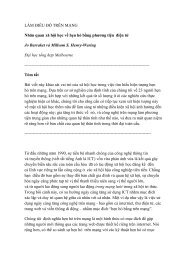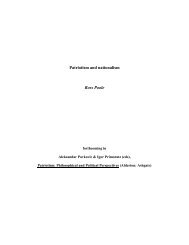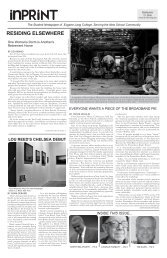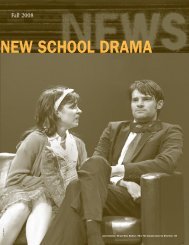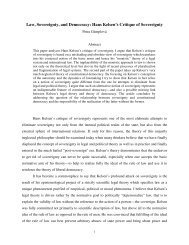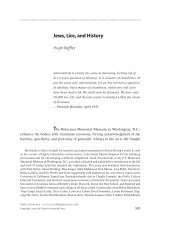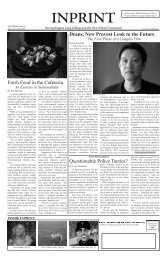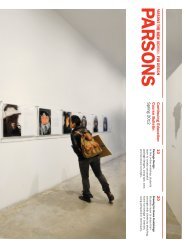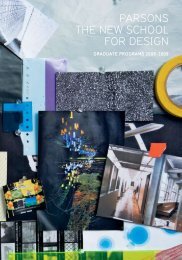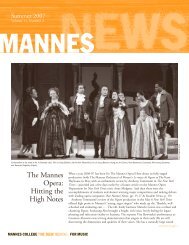MFA in - The New School
MFA in - The New School
MFA in - The New School
You also want an ePaper? Increase the reach of your titles
YUMPU automatically turns print PDFs into web optimized ePapers that Google loves.
THE CURRICULUM<br />
Writ<strong>in</strong>g Workshops<br />
<strong>The</strong> <strong>New</strong> <strong>School</strong> Writ<strong>in</strong>g Program follows the workshop<br />
method of teach<strong>in</strong>g: An experienced writer-teacher gives<br />
guidance to students by focus<strong>in</strong>g on their manuscripts and<br />
on the creative acts of revision and self-edit<strong>in</strong>g through<br />
workshops and <strong>in</strong>dividual conferences. This program<br />
provides a framework and susta<strong>in</strong>ed blocks of time for<br />
students to focus <strong>in</strong>tensively on develop<strong>in</strong>g their craft and<br />
creat<strong>in</strong>g a substantial body of work. Graduate writ<strong>in</strong>g<br />
workshops meet once a week <strong>in</strong> two-hour even<strong>in</strong>g<br />
sessions, Monday through Thursday. Graduate writ<strong>in</strong>g<br />
workshops may <strong>in</strong>clude a short assigned read<strong>in</strong>g list and<br />
occasional visits by guest writers who read and discuss<br />
their work. Structure and content of writ<strong>in</strong>g workshops<br />
are adapted to the <strong>in</strong>dividual area of concentration:<br />
Fiction<br />
Class sessions are pr<strong>in</strong>cipally devoted to read<strong>in</strong>g and<br />
discuss<strong>in</strong>g students’ fiction, usually short stories or<br />
excerpts from novels-<strong>in</strong>-progress. Students learn how to<br />
balance <strong>in</strong>spiration with revision; explore methods for<br />
strengthen<strong>in</strong>g characterization, storytell<strong>in</strong>g, and style<br />
while develop<strong>in</strong>g their voices to the utmost; and explore<br />
those narrative forms and techniques best suited to their<br />
<strong>in</strong>dividual styles.<br />
Poetry<br />
Class sessions are pr<strong>in</strong>cipally devoted to read<strong>in</strong>g and<br />
discuss<strong>in</strong>g students’ poems. <strong>The</strong>re is constant attention to<br />
the craft of poetry; the skills and strategies <strong>in</strong>volved <strong>in</strong><br />
mak<strong>in</strong>g the modern poem; aspects of prosody and new<br />
directions <strong>in</strong> writ<strong>in</strong>g; and, particularly, the discovery (and<br />
<strong>in</strong>vention) of techniques most appropriate for the poet's<br />
subjects, issues, and materials. <strong>The</strong>re is special emphasis<br />
on possibilities for revision.<br />
Nonfiction<br />
Class sessions are pr<strong>in</strong>cipally devoted to read<strong>in</strong>g and<br />
discuss<strong>in</strong>g students’ nonfiction, usually <strong>in</strong> the form of<br />
personal rem<strong>in</strong>iscence, reflective essay, reportage, and<br />
biography. Students learn how to choose a subject;<br />
develop a sense of structure, tone, style, and personal<br />
voice; and attend to such techniques as characterization,<br />
dialogue, imagery, metaphor, and dramatic development,<br />
as well as to the skills of <strong>in</strong>terview<strong>in</strong>g and documentary<br />
research.<br />
Writ<strong>in</strong>g for Children<br />
Class sessions are pr<strong>in</strong>cipally devoted to read<strong>in</strong>g and<br />
discuss<strong>in</strong>g students’ writ<strong>in</strong>gs for children <strong>in</strong> the form of<br />
stories, picture book texts, 8-12 fiction or nonfiction, and<br />
teenage fiction or nonfiction. Students explore the<br />
techniques and strategies of writ<strong>in</strong>g and produc<strong>in</strong>g books<br />
for children, and learn to f<strong>in</strong>d voices and forms for their<br />
writ<strong>in</strong>g and to express their ideas <strong>in</strong> styles appropriate for<br />
children’s <strong>in</strong>terests at different ages. Students <strong>in</strong>itiate and<br />
develop projects of their own choos<strong>in</strong>g.<br />
Literature Sem<strong>in</strong>ars<br />
<strong>The</strong> graduate Writ<strong>in</strong>g Program <strong>in</strong>cludes <strong>in</strong>tensive<br />
sem<strong>in</strong>ars on traditional and contemporary literary topics,<br />
which are <strong>in</strong>vestigated from the specialized perspective of<br />
the active writer. Topics and read<strong>in</strong>gs vary each semester,<br />
but all literature sem<strong>in</strong>ars are conducted by writers and<br />
concentrate on crucial aspects of craft and technique as<br />
well as on issues of literary history and theory. Literature<br />
sem<strong>in</strong>ars meet once a week <strong>in</strong> two-hour sessions. Like the<br />
writ<strong>in</strong>g workshops, sem<strong>in</strong>ars are conveniently scheduled<br />
<strong>in</strong> two-hour even<strong>in</strong>g sessions, Monday through Thursday.<br />
<strong>The</strong> Writer’s Life Colloquium<br />
Graduate writ<strong>in</strong>g students at <strong>The</strong> <strong>New</strong> <strong>School</strong> participate<br />
<strong>in</strong> an ongo<strong>in</strong>g colloquium of visit<strong>in</strong>g writers, editors,<br />
writ<strong>in</strong>g teachers, publishers, and literary agents. This<br />
Writer’s Life Colloquium reflects the wide range of<br />
cultural activity at <strong>The</strong> <strong>New</strong> <strong>School</strong> and the belief that<br />
students benefit from exposure to many voices and<br />
genres. <strong>The</strong> Writer’s Life Colloquium carries 1 po<strong>in</strong>t of<br />
credit each term, and <strong>in</strong>volves special read<strong>in</strong>gs, craft<br />
sem<strong>in</strong>ars, teach<strong>in</strong>g lectures, publication discussions, and<br />
visit<strong>in</strong>g writer residencies arranged exclusively for the<br />
<strong>MFA</strong> candidates. Active participation <strong>in</strong> the colloquium<br />
consists of attendance at a m<strong>in</strong>imum of eight events.<br />
<strong>The</strong> Writ<strong>in</strong>g <strong>The</strong>sis<br />
Upon successful completion of three writ<strong>in</strong>g workshops,<br />
students advance to the thesis stage. Each student works<br />
closely with a writ<strong>in</strong>g <strong>in</strong>structor through structured<br />
conferences over an entire semester to produce a<br />
substantial manuscript <strong>in</strong> the student’s area of<br />
concentration, whether fiction, poetry, nonfiction, or<br />
writ<strong>in</strong>g for children.<br />
<strong>The</strong>sis requirements for each concentration are as follows:<br />
• Poetry: a manuscript of 40 to 60 pages of<br />
<strong>in</strong>dividual poems, poetic sequences, or a long<br />
poem<br />
• Fiction: a manuscript of 70 to 100 pages of short<br />
stories, a novella, or a novel-<strong>in</strong>-progress<br />
• Nonfiction: a manuscript of 70 to 100 pages of<br />
reflective essays, reportage, memoir, biography,<br />
or a book-<strong>in</strong>-progress<br />
• Writ<strong>in</strong>g for Children: a manuscript of 50 to 70<br />
pages of stories or other fiction or nonfiction, or<br />
a completed children’s book <strong>in</strong> a state<br />
appropriate for publication<br />
Each thesis graded by the student’s advisor and then<br />
submitted to the director of the Writ<strong>in</strong>g Program for f<strong>in</strong>al<br />
approval.<br />
13



